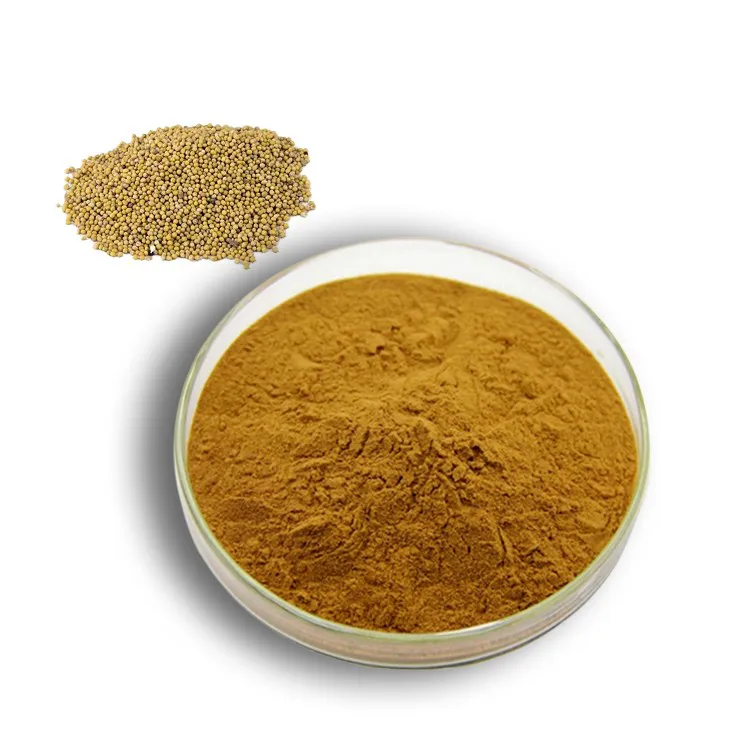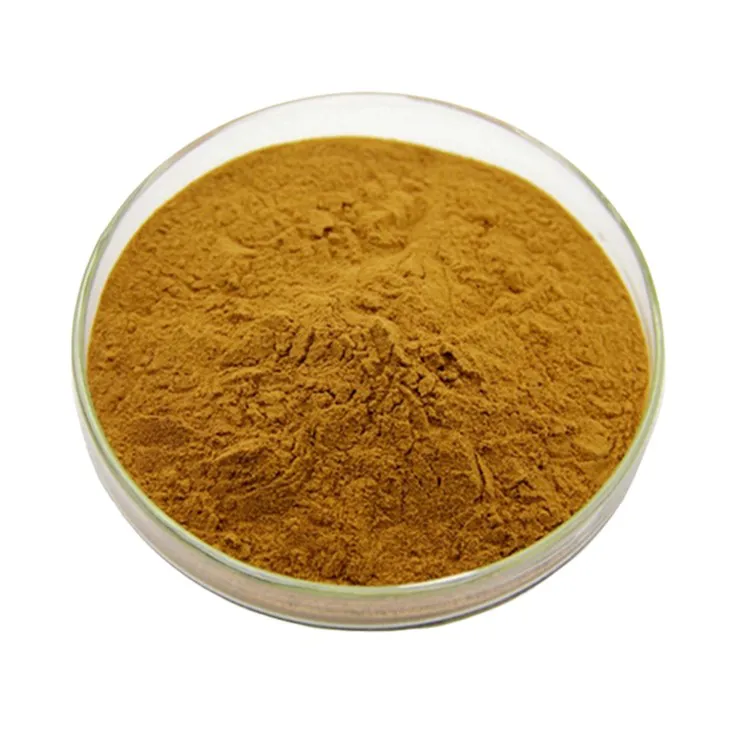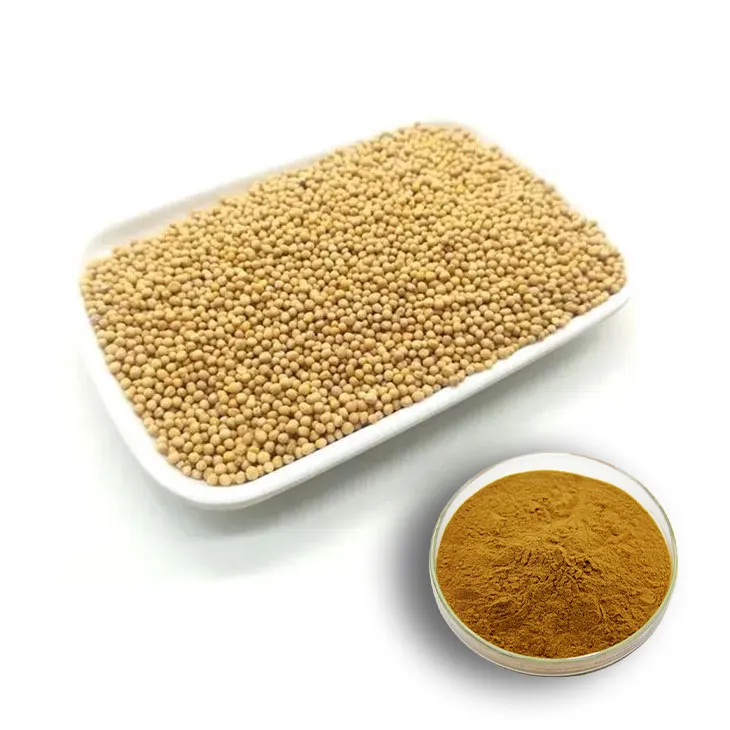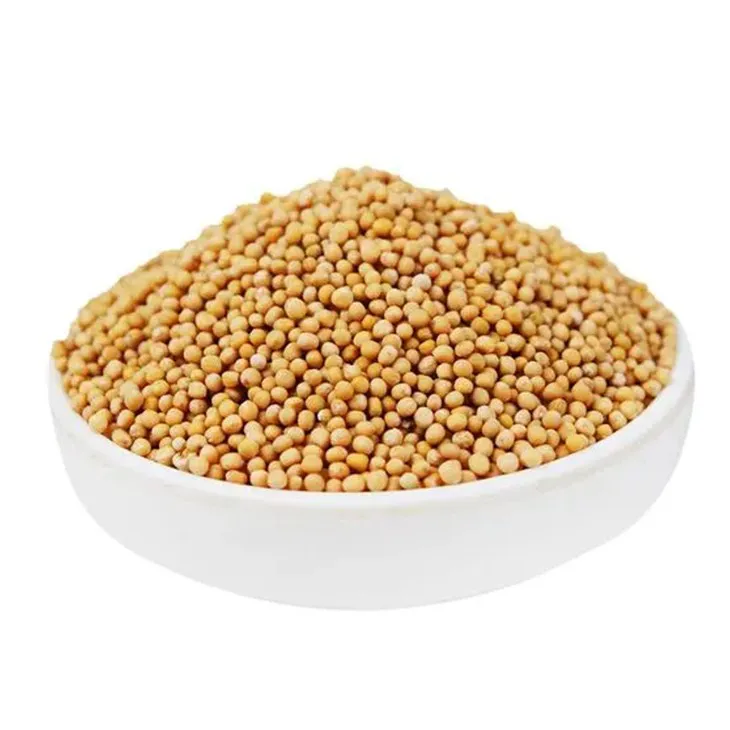- 0086-571-85302990
- sales@greenskybio.com
Use white mustard seed extract? Make sure you source from sustainable suppliers!
2024-12-20

Introduction
White mustard seed extract has been gaining popularity in various industries, from food and beverage to cosmetics and pharmaceuticals. Its unique properties, such as its pungent flavor in the food industry and potential health benefits in the medical field, have made it a sought - after ingredient. However, as the demand for White mustard seed extract grows, it is essential to consider the source of this extract. Sourcing from sustainable suppliers is not just an ethical choice but also has far - reaching implications for multiple aspects of the supply chain and the environment.

The Importance of Sustainable Sourcing
Economic Viability for Suppliers in the Long - Term
1. Stable Supply
- Sustainable sourcing practices ensure a stable supply of white mustard seeds. Suppliers who engage in sustainable farming methods, such as crop rotation and soil conservation, are more likely to have consistent yields over time. For example, by rotating white mustard crops with other legumes or cereals, farmers can improve soil fertility, which in turn leads to better growth of white mustard plants. This stability is crucial for meeting the growing demand for White mustard seed extract without sudden shortages or price fluctuations.
- It also helps suppliers build a reliable reputation in the market. Customers, especially those in the food and pharmaceutical industries, value consistency in supply. A sustainable supplier can guarantee a regular flow of high - quality white mustard seed extract, which can lead to long - term contracts and partnerships.
- Although sustainable farming may require some initial investment in practices like organic fertilizers or water - saving irrigation systems, in the long run, it can be cost - effective. For instance, reducing the use of chemical pesticides and fertilizers not only benefits the environment but also cuts down on input costs. Sustainable suppliers can pass on some of these cost savings to their customers, making their white mustard seed extract more competitive in the market.
- Furthermore, sustainable farming practices can reduce the risk of crop failure. By maintaining a healthy ecosystem on the farm, such as by promoting natural pest control through the presence of beneficial insects, the likelihood of losing an entire crop to pests or diseases is decreased. This means that suppliers can avoid the high costs associated with replanting or compensating for lost yields.
The Role in Maintaining Ecological Balance
1. Biodiversity Conservation
- White mustard plants are part of an ecosystem, and sustainable sourcing helps protect the biodiversity associated with them. In traditional farming systems, white mustard fields can provide habitats for a variety of insects, birds, and other small animals. For example, the flowers of white mustard plants attract bees and other pollinators. When suppliers source sustainably, they are more likely to maintain natural habitats and avoid practices that would harm these species. This is crucial for the overall health of the ecosystem, as each species plays a role in pollination, nutrient cycling, and pest control.
- Moreover, sustainable farming of white mustard can also support the growth of other plant species in the area. By using natural fertilizers and avoiding soil degradation, the soil can support a diverse range of plants, which in turn can provide food and shelter for a wider variety of animals.
- White mustard is known to have certain properties that can improve soil health. However, sustainable sourcing ensures that these benefits are maximized without causing long - term damage to the soil. For example, when white mustard is grown as part of a crop rotation system, its deep - rooting nature can help break up compacted soil, improving its structure and allowing for better water infiltration and air circulation. This is in contrast to intensive monoculture farming, which can deplete soil nutrients and lead to soil erosion.
- Sustainable suppliers may also use organic matter and compost to enrich the soil, which further enhances its fertility. This not only benefits the growth of white mustard plants but also has a positive impact on the surrounding environment. Healthy soil can sequester carbon, helping to mitigate climate change.
- Many sustainable farming practices focus on water conservation. For white mustard seed production, this can include techniques such as drip irrigation or rainwater harvesting. Drip irrigation delivers water directly to the roots of the plants, reducing water wastage compared to traditional flood irrigation methods. Rainwater harvesting allows farmers to collect and store rainwater for use during dry periods, reducing their reliance on freshwater sources.
- By conserving water, sustainable suppliers can contribute to the overall water security in the region. In areas where water is scarce, this is especially important. Additionally, less water - intensive farming practices can also help reduce the energy required for pumping and treating water, further reducing the environmental footprint of white mustard seed production.
How it Affects End - Product Quality
1. Purity and Safety
- White mustard seed extract sourced from sustainable suppliers is more likely to be pure and safe. Sustainable farming practices generally avoid the use of harmful pesticides and chemical fertilizers that could contaminate the seeds. In the food and pharmaceutical industries, product purity and safety are of utmost importance. For example, in the production of dietary supplements containing white mustard seed extract, any trace of pesticides could pose a risk to consumers' health.
- Moreover, sustainable suppliers are more likely to follow strict quality control procedures. They understand that their reputation depends on providing a high - quality product, and they take steps to ensure that the extraction process is clean and free from contaminants. This includes proper handling and storage of the seeds before extraction, as well as using advanced extraction techniques that preserve the integrity of the active compounds in the extract.
- The quality of the white mustard seed extract can also affect its potency and efficacy. When sourced sustainably, the plants are likely to be grown in optimal conditions, which can result in a higher concentration of beneficial compounds in the seeds. For example, in the cosmetics industry, white mustard seed extract is sometimes used for its anti - inflammatory properties. If the extract is sourced from plants that have been grown in a healthy, sustainable environment, it is more likely to have a stronger anti - inflammatory effect.
- Similarly, in the pharmaceutical industry, the potency of white mustard seed extract can be crucial for its effectiveness in treating certain medical conditions. Sustainable sourcing can ensure that the extract contains the right balance of active ingredients, making it more likely to produce the desired therapeutic effects.

Challenges in Sourcing Sustainably
1. Cost Considerations
- One of the main challenges in sourcing white mustard seed extract from sustainable suppliers is the cost. As mentioned earlier, while sustainable farming can be cost - effective in the long run, the initial investment in sustainable practices can be significant. This can lead to higher prices for the extract compared to non - sustainable sources. For small - and medium - sized businesses, especially those in competitive markets, this cost difference can be a deterrent to choosing sustainable suppliers.
- However, it is important to note that as the demand for sustainable products grows, economies of scale may come into play. More businesses opting for sustainable white mustard seed extract can lead to increased production volumes, which could potentially drive down the cost per unit in the future.
- Determining whether a supplier is truly sustainable can be a complex process. There are various sustainability certifications available, such as organic certifications or fair - trade labels. However, not all suppliers may have these certifications, and even among those that do, the verification process can be challenging. Some certifications may have different standards or may not cover all aspects of sustainability.
- For businesses looking to source sustainable white mustard seed extract, it can be difficult to navigate through the maze of certifications and ensure that they are getting a product that meets their sustainability requirements. This requires careful research and potentially on - site visits to suppliers to verify their practices.
- In a globalized market, the white mustard seed extract supply chain can be complex and opaque. It can be difficult to trace the origin of the seeds and ensure that all stages of production, from farming to extraction, are sustainable. Middlemen in the supply chain may not always provide accurate information about the source of the product.
- To ensure supply chain transparency, businesses may need to invest in technologies such as blockchain or work closely with suppliers to establish clear communication channels. This can be time - consuming and resource - intensive, but it is essential for truly sustainable sourcing.

Making an Informed Choice
1. Researching Suppliers
- When looking for sustainable white mustard seed extract suppliers, thorough research is key. Start by looking for suppliers with recognized sustainability certifications. These certifications can provide some assurance of the supplier's commitment to sustainable practices. However, as mentioned earlier, don't rely solely on certifications. Dig deeper into the supplier's farming methods, such as their use of fertilizers, pesticides, and water management practices.
- Look for information about the supplier's history and reputation in the market. Customer reviews and testimonials can be a valuable source of information. Additionally, try to find out if the supplier is involved in any industry initiatives or partnerships related to sustainability.
- Local suppliers can offer several advantages when it comes to sustainable sourcing. Firstly, they can often provide more transparency in the supply chain as it is easier to visit and monitor their operations. For example, a local white mustard seed extract supplier may be more willing to show you their farming fields and extraction facilities.
- Secondly, sourcing locally can reduce the carbon footprint associated with transportation. White mustard seed extract that has to be shipped over long distances can have a significant environmental impact due to fuel consumption. By choosing a local supplier, you can contribute to reducing greenhouse gas emissions.
- Businesses can also consider collaborating with suppliers to improve sustainability. For example, a large food company could work with its white mustard seed extract suppliers to invest in sustainable farming practices. This could include providing financial support for the transition to organic farming or sharing knowledge on water - saving irrigation techniques.
- Partnerships can also be formed between different stakeholders in the supply chain, such as farmers, suppliers, and end - users. These partnerships can help drive innovation in sustainable sourcing and ensure that all parties benefit from the process. For instance, a research institution could collaborate with farmers and suppliers to develop new, more sustainable extraction methods for white mustard seed extract.

Conclusion
White mustard seed extract has great potential in various industries, but sourcing it sustainably is crucial. The economic viability of suppliers, the maintenance of ecological balance, and the quality of the end - product all depend on sustainable sourcing practices. While there are challenges in sourcing from sustainable suppliers, such as cost, certification, and supply chain transparency, businesses can make informed choices by researching suppliers, considering local options, and forming collaborations. By making these efforts, we can ensure a better future for the white mustard seed extract industry, with sustainable production that benefits both the environment and the end - users.
FAQ:
Q1: Why is it important to source white mustard seed extract from sustainable suppliers?
It is important for several reasons. Firstly, from the perspective of suppliers, sustainable sourcing ensures their long - term economic viability. If they over - exploit resources, they may face shortages in the future. Secondly, for the ecological balance, sustainable sourcing helps protect the environment where white mustard is grown. This includes maintaining soil quality, conserving water, and protecting biodiversity. Finally, it can also affect the end - product quality. Sustainably sourced white mustard seed extract is more likely to be of consistent and high quality, which is crucial for various applications.
Q2: How can one identify a sustainable supplier of white mustard seed extract?
There are several ways. One can look for certifications such as organic certifications which often imply sustainable farming practices. Suppliers that are transparent about their sourcing methods, including information on where they get their white mustard seeds from, how they are grown, and what measures they take to ensure sustainability, are more likely to be reliable. Additionally, reviews and testimonials from other customers who have used their white mustard seed extract products can also provide insights into their sustainability practices.
Q3: What are the potential consequences of not sourcing white mustard seed extract sustainably?
If not sourced sustainably, in the short - term, there may be issues with the quality and consistency of the extract. In the long - term, for suppliers, it can lead to depletion of white mustard resources, making it difficult to continue production. Ecologically, it can cause damage to the ecosystems where white mustard is grown. For example, over - farming without proper soil management can lead to soil degradation, and excessive use of pesticides can harm local wildlife and pollute water sources.
Q4: Are there any regulations regarding the sustainable sourcing of white mustard seed extract?
Currently, there may be some general agricultural and environmental regulations that can apply. For example, regulations regarding pesticide use, soil conservation, and water management in the regions where white mustard is grown. However, specific regulations for the sustainable sourcing of white mustard seed extract may vary by region. Some countries or regions may have initiatives or guidelines in place to promote sustainable agriculture, which white mustard seed extract suppliers may need to adhere to.
Q5: How does sustainable sourcing of white mustard seed extract contribute to the overall quality of products that use it?
Sustainable sourcing often means better quality control throughout the production process. For example, if the white mustard seeds are grown in a healthy, well - managed environment, they are more likely to be of good quality. This in turn leads to a higher - quality extract. Sustainable practices also reduce the risk of contamination from pesticides or other harmful substances, which can improve the safety and purity of the extract. When used in end - products, this high - quality extract can enhance the overall performance and quality of those products.
Related literature
- Sustainable Sourcing in the Food Industry: A Case of Mustard Seed Extract"
- "The Importance of Sustainable Suppliers for Botanical Extracts: Focus on White Mustard"
- "Ecological and Quality Aspects of Sustainably Sourced White Mustard Seed Extract"
- ▶ Hesperidin
- ▶ citrus bioflavonoids
- ▶ plant extract
- ▶ lycopene
- ▶ Diosmin
- ▶ Grape seed extract
- ▶ Sea buckthorn Juice Powder
- ▶ Beetroot powder
- ▶ Hops Extract
- ▶ Artichoke Extract
- ▶ Reishi mushroom extract
- ▶ Astaxanthin
- ▶ Green Tea Extract
- ▶ Curcumin Extract
- ▶ Horse Chestnut Extract
- ▶ Other Problems
- ▶ Boswellia Serrata Extract
- ▶ Resveratrol Extract
- ▶ Marigold Extract
- ▶ Grape Leaf Extract
- ▶ blog3
- ▶ blog4
- ▶ blog5
-
Pure 85% Tomentil Extract.
2024-12-20
-
Yellow Pine Extract
2024-12-20
-
Passionflower Extract
2024-12-20
-
Apricot Powder
2024-12-20
-
Tinospora cordifolia extract
2024-12-20
-
Peppermint Extract Powder
2024-12-20
-
Yam Extract
2024-12-20
-
Maca Extract
2024-12-20
-
Genistein
2024-12-20
-
Grape Leaf Extract
2024-12-20
-
Baicalin
2024-12-20





















